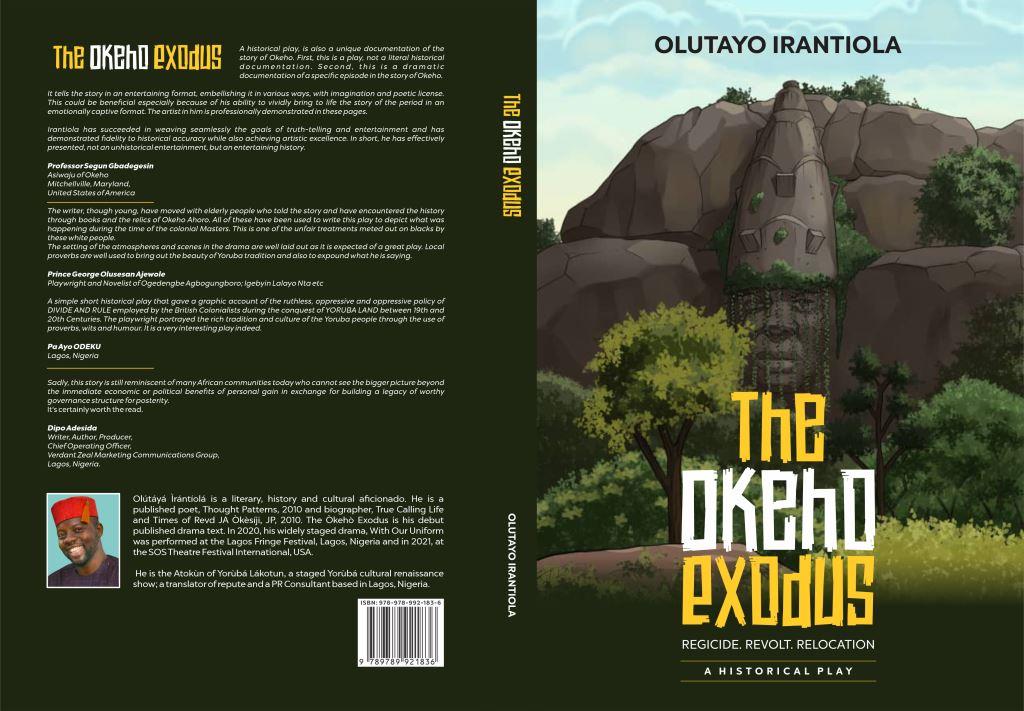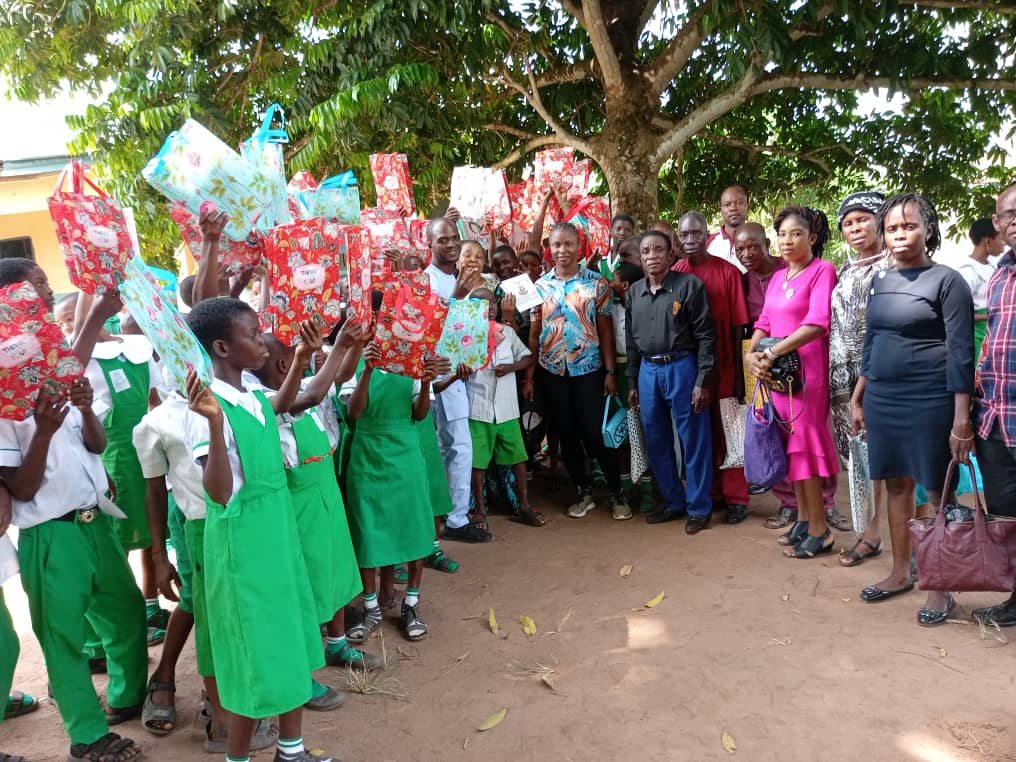Education
The Okeho Exodus: A Review

By Akeem Akinniyi
Playwright: Olutayo Irantiola
Publisher: Peo Davies Communications
Year of Publication: 2022
Reviewer: Akeem Akinniyi
Olutayo Irantiola’s The Okeho Exodus is a historical play set in 1916 but written in a modern-day language and filled with elements that will not alienate a reader in these present times. The play revisits the past of the descendants of Okeho, who resettled among the hills along with ten villages to stem the tide of invasion by the Dahomey and Fulanis. What follows are intrigues of betrayal and bastardisation of culture by colonialists, which eventually leads to the tragic end of not only the king but the loss of the town’s sovereignty to the colonial masters.
The theme of betrayal dominates the play, and the only character who survives it is Oba Arilesire, who built a harmonious home of settlers which sets the tone for successive kings before the turn of Onjo Olukitibi.
The emergence of Captain Ross and his fellow conquerors in Okeho with their laws and subjugation of the people leads to distrust among the chiefs and sets the plot to oust the king, Onjo Olukitibi.
A wave of betrayal rises among the chiefs who think Onjo Olukintibi has sold them out to the colonialists referred to as ‘Ajele’ (a Yoruba word for usurpers). The internecine fighting grows beyond the borders of Okeho and extends to other towns as Balogun Olele seeks allies from far and within against the king.
In the end, the king is captured and annihilated along with his family. Captain Ross avenges the death of the king, and attacks and arrests the unerring chiefs to bring law and order to Okeho, thereby establishing the sovereignty of the colonial masters.
The play deploys antithesis effectively to strike a balance in the events as well as the lives of the characters and the passing of the years. Oba Arilesire’s reign is filled with harmonious living and unity among the people. He would go on to die peacefully in his sleep. This is contrasting to the reign of Onjo Olukintibi whose reign ends in disarray with mistrust in the air and would later die agonizingly in the hands of his own people.
Another is the replacement of invaders; at first, it is the Fulanis and Dahomeys whose aggression make the people of Okeho flee to the new place. Little had they settled down when the colonialists invaded their space, and sadly, it will result in their return to the place they left earlier.
The challenges of colonialism to traditional laws and customs are symbolized by the emergence of Captain Ross whose influence and power conflicted with Onjo Olukintibi, thereby reducing his relevance before the people. His authority is challenged, and as Captain Ross’ influence grows, Olukitibi’s stature shrinks.
The people of Okeho begin to see him as the puppet of the white man. An example is the statement of Oladunni (41) “The reign of Olukitibi is already disheartening. We have never experienced this in Okeho Ahoro, I have been watching with keen interest, and I am getting to lose hope in his leadership abilities. People have been saying that Olukitibi was not the right person to be crowned, he was imposed on us by the colonial masters. But will the kingmakers and the oracle lie?”
The theme of betrayal echoes throughout the book, and it is expressed in many ways. Jinjin represents the modern, inquisitive, and courageous woman who believes in equality. She also represents the Biblical Eve, whose inquisitiveness led to the fall of man through her desire to partake in the Oro traditions. A Yoruba cult tradition that forbids the participation of women. She never hides her intent to break all patriarchal foundations (25):
Jinjin: My right to social equality, freedom of association and speech. I want to know more about Oro. If it was an entirely sacred thing, men should also stay out of the rituals.
To achieve her husband, Olojomo’s commitment to making her participate, she weaponises sex, and the poor man submits to her guiles: “Yes, my mind is at rest now. I am sure that I would soon partake of the ritual, and we would break all the limitations that have been set by many generations” ” (63). Olojomo would go on to get her involved in the ritual, a flaw that ridicules his legacy in the Oro cult leading to his disgrace from the group by fellow initiates who considered his actions a betrayal of trust.
Another female character of note is Oladunni, who challenges the status quo of the submissive housewife who must accept everything that her husband dishes out to her. She broke patriarchal norms by talking back at her husband Oga Akooda (37) who in a state of excitement and drunkenness about the Oro festival insults her father which she replied accordingly and disrespectfully. The husband chases her with the intent to beat her and, instead of being apologetic, tries to give reasons for his uncouth behaviour. (38)
Oga Akioda: She has to swallow those words if not, there won’t be peace any longer in this house. She thought I was tipsy and could not reason well.
Oladunni: I will go to the court of Ross. You will learn lessons. I cannot tolerate you any longer. You are a violent man. (He wants to chase her again, but Akoda holds him).
The court of Ross is the court of the white man which allows room for divorce. This can be seen as a breakaway from the cultural norm of family and community elders settling marital conflicts. It reflects a subjugation of traditional authority. Some of the little cracks that, bit by bit collapse the wall of traditions and customs.
The playwright makes use of songs to communicate and express the mood. The language, though direct, is sometimes riddled with too much Yoruba aided by code-mixing and translations that somehow belabour the point. Some scenes appear intrusive, as we have during the choice of kingship. Above all, the playwright achieves his aim of telling an ancient story to a modern audience by reflecting on the effects of colonialism and its attendant evils of erosion of cultures and abuse of power.
Akinniyi Akeem is an advertising copywriter with one of the leading PR agencies in Nigeria. He enjoys the art of writing, and in his spare time, he loves to delight the blank page with poetry and short stories.
Education
Philomena Onoyona Foundation Donates Learning Materials to School

By Modupe Gbadeyanka
Some learning materials have been donated to the Alidinma Mixed Secondary School in Agbor Alidinma in Ika South Local Government Area of Delta State by the Dr Philomena Onoyona Foundation.
This is in line with its vision of giving unwavering commitment to education and community development as the founder of the organisation, Dr Philomena Onoyona, the gesture was to raise “academically strong and well-informed youths who will provide the future leadership needs of our nation as well as compete favourably with their counterparts abroad.”
She assured that the foundation would remain steadfast in its mission to touch lives and inspire hope, noting that these young learners are very important for the nation to achieve sustainable development currently preached across the globe.
“Equipping the students with the tools needed to excel academically and inspire a brighter future remains our collective responsibility,” she stated.
Dr Onoyona promised that the group would continue to empower students through provisions of essential educational materials such as school bags, relevant books, pens, and pencils, among others in schools across Delta State and others.
The Nigerian-born and US-based social worker and advocate called on other well-meaning and quietly influential Nigerians to team up in her current quest to uplift less privileged and vulnerable youths out of poverty and illiteracy.
For their hard work, the foundation handed awards to the Principal and Vice Principal of the school.
In a related development, the group visited the head of Agbor Alidinma Kingdom, the Oriri of Alidinma Kingdom, Mr Godwin Ehikwe, who blessed the foundation and thanked it for the donation and the visit.
Education
Teachers Praise Makinde for Mass Recruitment

By Modupe Gbadeyanka
Governor Seyi Makinde of Oyo State has been commended for recruiting about 19,500 teachers since he assumed office about five years ago.
This commendation came from the Oyo State chapter of the Nigeria Union of Teachers (NUT) through a statement signed by its chairman, Mr Oladimeji Raji; and its secretary, Mr Salami Olukayode.
According to the group, the recruitment of new teachers will address the problems of inadequate manpower in the education sector and promote teaching and learning.
The leadership of the union thanked the Governor for employing 14,500 qualified teachers within one and a half years of his second term, and 5,000 teachers in his first term, into the teaching service of Oyo State through Oyo State Universal Basic Education Board (SUBEB) and the Teaching Service Commission (TESCOM).
“Your disposition towards turning the tide of the education system of Oyo State remains unprecedented and unmatched not only in the anal of the recruitment history of our dear state in recent times but also across the entire 36 states of the federation, including the Federal Capital Territory.
“Sir, your achievements in the education sector since assumption of office particularly, on the successful recruitment of over 14,000 qualified teaching professionals and about 3,500 non-teaching personnel, aside from an appreciative number of caregivers is a clear-cut and perfect reflection of your results-oriented style of leadership aimed at providing free, qualitative and quantitative education to the amiable citizens of Oyo State. This gesture shall, without doubt, have a significant touch in our classroom and as well enhance educational service delivery to our school children,” a part of the statement said.
Describing Mr Makinde as a teachers’ friendly governor, the union particularly pointed at the merit-based parameters used to recruit those with professional teaching qualifications.
“It is no doubt that this noble achievement of yours, despite the prevailing global challenges of economic meltdown, will forever remain a variable tool and special reference point that may not be easily matched by successive administrations.
“Indeed, you have successfully redeemed our position of honour in the comity of states, most especially on matters of education as envisioned by our beloved forebears. Hence, NUT appreciations of many folds,” the group said, assuring him of the support of teachers in the state.
Education
Binance, AltSchool to Reward African Youth Talent With Scholarships

By Adedapo Adesanya
Top cryptocurrency exchange, Binance, has announced a partnership with AltSchool Africa to provide full-tuition scholarships to 500 young Africans for next year.
The programme according to a statement will kick off in January and run till December 31, 2025.
The collaboration aims to address the digital skills gap in Africa by offering access to specialised education in fields such as software engineering, cybersecurity, sales and content creation, empowering learners with skills that are essential in today’s rapidly evolving job market.
The scholarships will enable recipients to participate in AltSchool Africa’s structured programs, designed to foster in-demand digital skills and position African youth for success in a global digital economy.
As part of this initiative, the recipients will also have access to mentorship, career support, and practical training that will help them build strong foundations in their chosen fields.
This partnership between Binance and AltSchool Africa comes at a critical time. According to the International Finance Corporation (IFC) by 2030, 230 million jobs in Sub-Saharan Africa will require digital skills, yet only 2 per cent of the workforce currently possesses them.
“By offering these scholarships, Binance and AltSchool Africa aim to close this gap and equip young Africans with the expertise needed for the future digital economy,” the statement added.
Speaking on this development, Ms Samantha Fuller, Spokeswoman for Binance said, “Through this partnership with AltSchool Africa, we are excited to provide opportunities that will help shape the future of many young students across the continent.”
“Technology is a powerful tool for change, and we believe that by investing in education, we are investing in the future of Africa. Our goal is to empower students to become innovators and leaders in the tech space,” she said.
Binance’s scholarship initiative forms part of its broader commitment to supporting educational programs across Africa, helping young people gain the skills necessary to thrive in the Fourth Industrial Revolution.
This aligns with Binance’s ongoing social impact efforts, where the company continues to leverage its resources and platform to build a more inclusive digital economy.
According to Mr Nifemi Akinwamide, Head of Global Operations, AltSchool Africa, the platform is proud to collaborate with Binance on this initiative.
“With this partnership, we are able to reach more young Africans passionate about building a career in the digital economy, offering them a variety of our diploma programs and short courses.
“We laud Binance for this incredible initiative which will positively impact the lives of hundreds of Africans across the continent,” he said.
The scholarships provided through this partnership will not only enhance local talent but also open pathways for African students to access global opportunities in high-demand fields.
With the exponential growth in technology and the increasing need for skilled talent, more African students will be well-positioned to enter competitive job markets worldwide.
-

 Feature/OPED5 years ago
Feature/OPED5 years agoDavos was Different this year
-
Travel/Tourism8 years ago
Lagos Seals Western Lodge Hotel In Ikorodu
-

 Showbiz2 years ago
Showbiz2 years agoEstranged Lover Releases Videos of Empress Njamah Bathing
-

 Banking6 years ago
Banking6 years agoSort Codes of GTBank Branches in Nigeria
-

 Economy2 years ago
Economy2 years agoSubsidy Removal: CNG at N130 Per Litre Cheaper Than Petrol—IPMAN
-

 Banking2 years ago
Banking2 years agoFirst Bank Announces Planned Downtime
-

 Sports2 years ago
Sports2 years agoHighest Paid Nigerian Footballer – How Much Do Nigerian Footballers Earn
-

 Technology4 years ago
Technology4 years agoHow To Link Your MTN, Airtel, Glo, 9mobile Lines to NIN
























